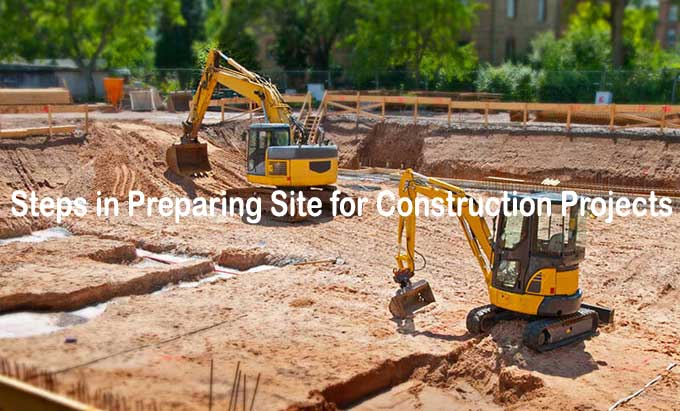
Preparation of Construction Sites in Various Stages

You should fully understand what goes into preparing a site. Even though it isn't the most glamorous process in the world, site preparation is crucial to a construction project's success. Construction works begin with site preparation. The chosen preparation set-up must complete before any construction can begin.
Define Site Preparation in Construction
The preparation of the construction site is a step that must be taken in advance of the beginning of other construction activities. Neither the failure nor the success of site preparation will affect how other construction activities execute on-site.
Site preparation is defined in such a way as to emphasize its importance to building construction. It is also highly recommended to implement a construction schedule software because it is highly important during the construction process.
Site preparation is also defined as a series of activities and tasks performed before engineers begin any work on a site. That will enable the construction of a new building, and the preparation of the site will be a lot easier.
Steps Involved in Site Preparation for Construction Projects
Site preparation needs to plan out. The following steps are described in detail:
1. Clearing the Site
The very first step in preparing a site is to clear it. It is necessary to grade and clear the whole area. A structure is being demolished, trees are being cut down, and underground infrastructure is being removed.
It would be better to avoid these obstacles in the first place, as they could hamper the building process in the future. The completion of the project could also be at risk if clearing the site does not succeed. As a result, it needs to be dealt with once and for all.
2. Surveying the Site
Surveyors are responsible for surveying the site to determine where roads or structures are to be built. The survey pegs that mark the position of the building blocks may not be able to determine the correct block where you are planning to build. Surveying land may not be an option, but most zoning and permit processes require it. Furthermore, surveying involves translating a contractor's set of plans into a real-life map of the site.
3. Soil Test
The soil test is one of the most important tasks that must be completed before the site is selected. The main composition of the soil should be determined to test for water absorption capability and strength. An engineer on site must insist that all soil testing procedures are conducted before starting any structural work.
4. Designing the Site Plan
Once the soil has been tested, all septic tanks and drainage systems should be installed. Next, the plan will modify to show the location of fixtures and septic tanks. Furthermore, a permanent record should keep of the underground areas.
Constructing a house is a living, breathing thing. Because of this, it constantly changes as the water tank placements vary. Changes occur as a result of underground rock formations. During the design process, a crew scheduler superior is a helpful tool.
5. Investing the Site
An in-depth geological investigation of any proposed site is conducted to characterize its rock, soil, and groundwater conditions. The purpose of a geotechnical site investigation is to assess the site conditions in order to build and design the foundation of a structure. Some typical examples are parking lots, roads, bridges, and buildings.
Required Time for Preparing a Construction Site
All assessments are complete, and construction is soon to start. We've finally got plans approved and assessments completed. It usually takes between 1-2 months to prepare a site for residential construction projects. A multi-commercial project may require a longer timeline, depending on its scope.
The timeline often varies depending on how dense and large the construction projects are. Because of this, contractors must make sure that their clients make timely decisions. In this way, the work is simplified, and timelines are carefully analyzed. A successful build requires a skilled team.
Conclusion
New land must be ready and prepared for construction before construction can begin.
It is critical to include various preparation activities like site clearing, site surveying, and investigation. Preparation of the site for construction is vital to the success of any project. Nevertheless, some projects require more planning and methods than others.


